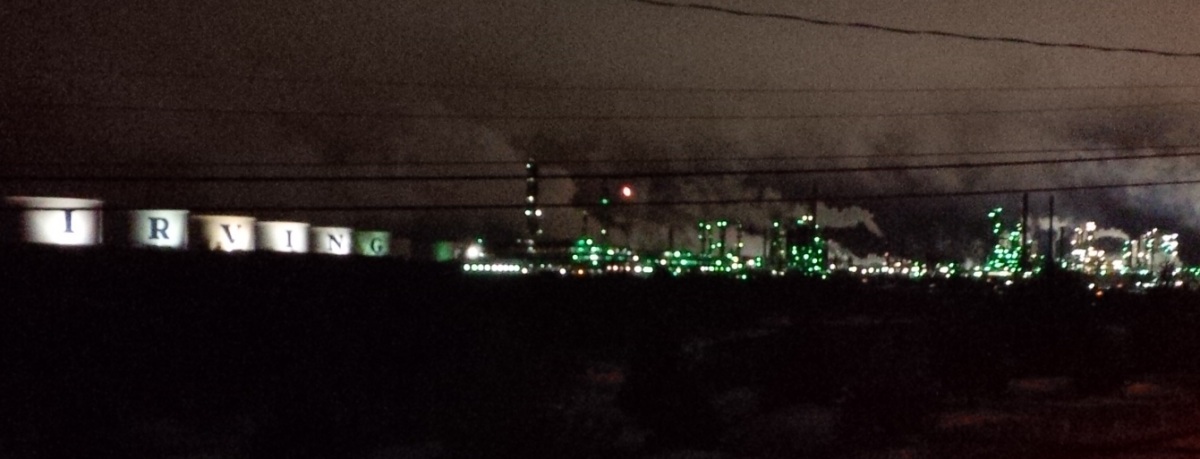The Globe and Mail has reported, “Since 2012, the billionaire Irving family has been advocating a proposal called Energy East.”
The 4,400-kilometre pipeline would transport 1.1 million barrels per day from northern Alberta to New Brunswick and markets beyond. The Pembina Institute has calculated the pipeline would result in 32 million tonnes of greenhouse gases a year (not counting the subsequent emissions related to refining, refined transportation, distribution and consumption). They also note that filling the Energy East pipeline would help spur 650,000 to 750,000 barrels per day of additional production from the tar sands, a 40 per cent increase in extraction.
The newspaper highlights, “If it is built, it will stop … at a $300-million marine terminal (the Irvings) are planning to build in Saint John, New Brunswick, to service the project. The Irvings also would be among the top beneficiaries. A study commissioned by TransCanada and prepared by Deloitte calculated that the pipeline’s access to cheaper crude from the west would save as much as $1.2-billion per year for a refinery owned by the Irvings … The family’s industrial empire in New Brunswick, a century in the making, can help make (the pipeline) possible … Their flagship company, Irving Oil, runs the East Coast’s only ice-free, deep-water oil port capable of receiving the largest crude tankers. It also operates Canada’s largest oil refinery — the source of nearly one in three tanks of gasoline imported to the East Coast of the United States. … Irving Oil’s CEO, Paul Browning, said at the formal announcement of Energy East that the company was ‘extremely pleased to be partnering with TransCanada.'”
“In October 2012, representatives from Irving Oil and New Brunswick’s government travelled to the western Canadian oil hub of Calgary to present their alternative: a west-east oil pipeline that would go all the way to the Atlantic. Irving Oil had asked for the meeting, according to a person who attended. Waiting for them in a conference room were Canadian provincial energy officials, executives from TransCanada, and representatives from industry heavyweights Canadian Natural Resources, Imperial Oil, Suncor, and Shell Canada.”
“According to (New Brunswick energy minister Craig) Leonard and others at the meeting, Mike Ashar, at the time the CEO of Irving Oil, outlined how a pipeline east across Canada to Saint John could help get Alberta’s oil efficiently to the world market, paving the way for higher prices and the potential for expanded production. Ashar said the pipeline could provide a reason to build Canada’s first oil sands upgrader — a facility that processes tar sands into a product that can be more easily refined into gasoline, diesel and other fuels — on the Atlantic coast. There, lower labour costs and easy access to imports could reduce the facility’s multibillion-dollar price tag by 40 per cent, according to an attendee who asked not to be named.”
While the New Brunswick government appears to unquestionably back the pipeline, Conservation Council of New Brunswick activists Matt Abbott and Stephanie Merrill have commented, “In New Brunswick, we have a long way to go in coming to terms with the risks as the 400 kilometres of new pipeline is proposed to cross 195 waterways, provincially significant wetlands, 3 Natural Protected areas, a number of municipal aquifers and unceded Wabanakai territory.” Abbott has also said that existing tanker traffic in the Bay of Fundy is already disrupting whales and other marine mammals, and a double or tripling of traffic (with the tanker traffic resulting from this export pipeline) will only make matters worse.”
The Council of Canadians has just completed a six-city tour in Ontario in opposition to the Energy East pipeline. Look for updates on our next steps in this campaign to stop this pipeline soon.
Photo: The Irving refinery in Saint John, New Brunswick currently produces about 300,000 barrels a day of finished energy products, half of which is exported to the United States. Photo by Brent Patterson.




